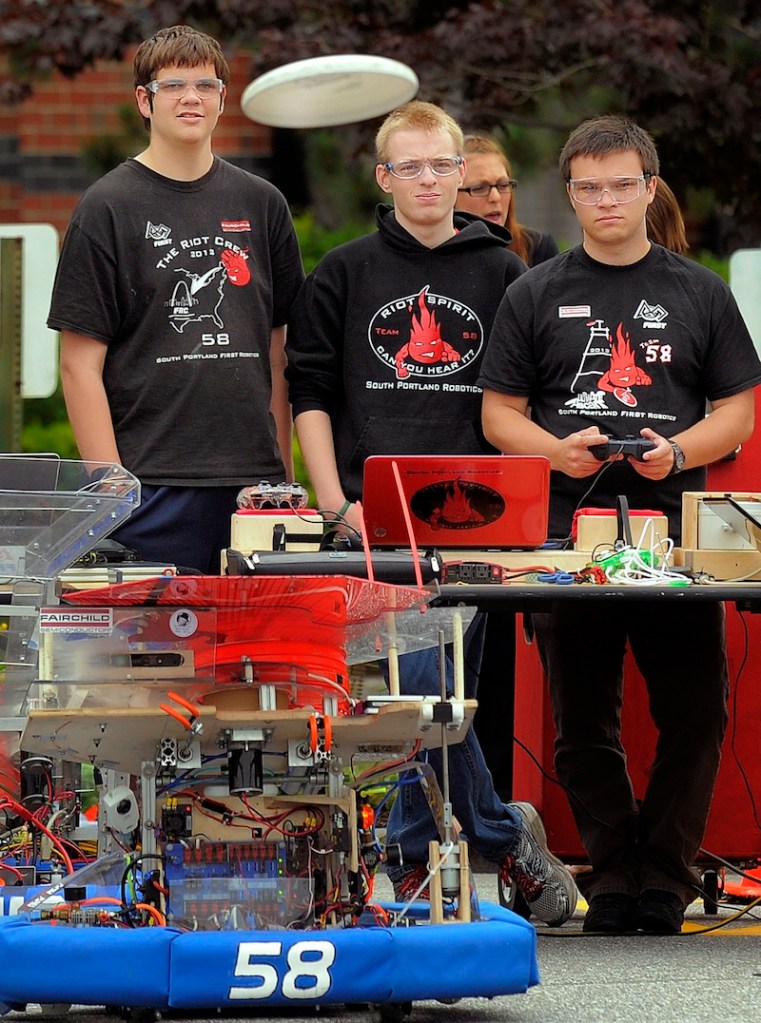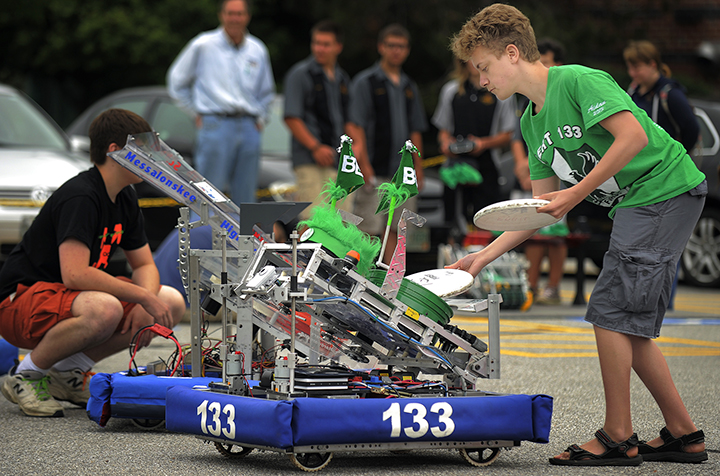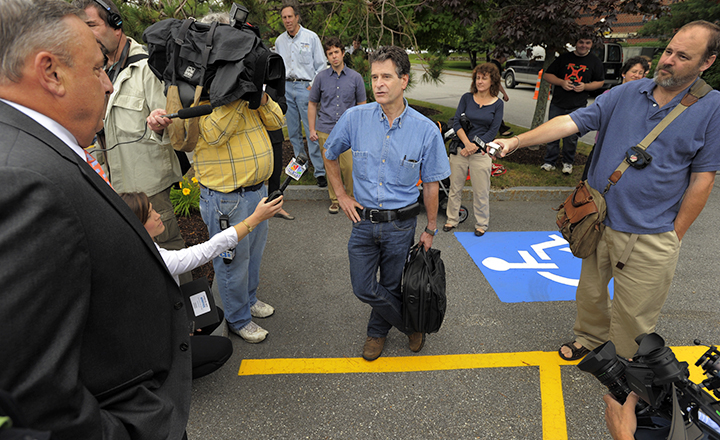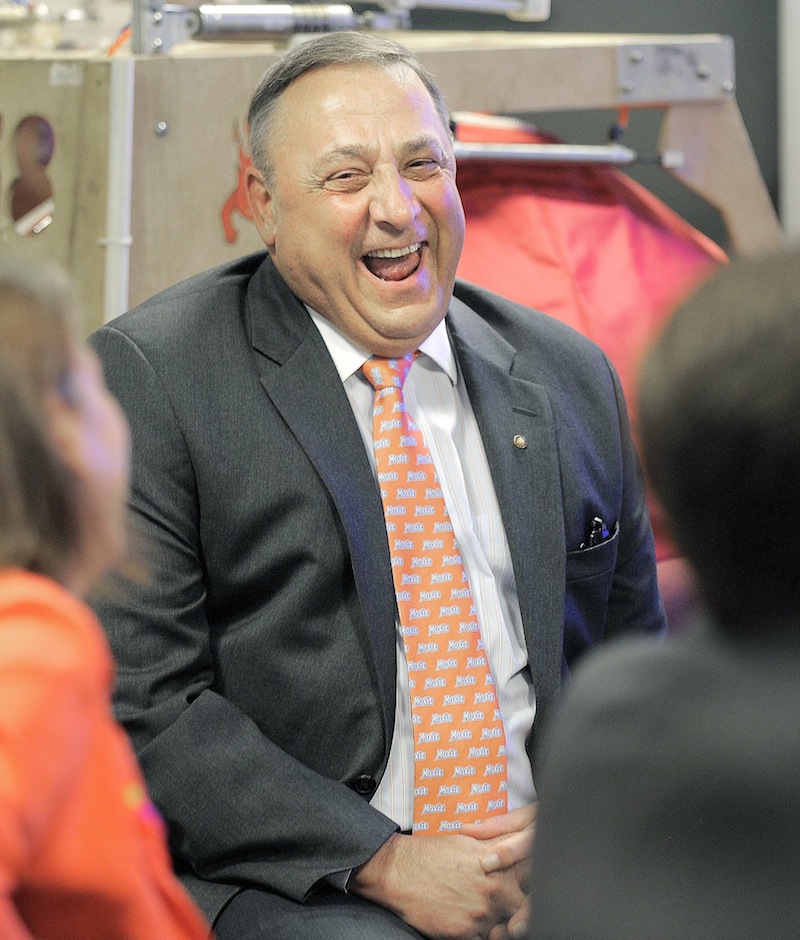SOUTH PORTLAND — Gov. Paul LePage and inventor Dean Kamen helped unveil the new Robotics Institute of Maine, which will help students afford to participate and compete on robotics teams.
More than 100 students, engineers and robotics supporters gathered Thursday in a parking lot at Fairchild Semiconductor, which has sponsored individual teams in the past and is providing $100,000 to launch the institute and encourage other parties to donate. The headquarters will be housed at the Manufacturers Association of Maine in Westbrook.
The institute’s goal is to double the number of students participating on robotics teams to 1,000 by 2016, expand the reach of teams into rural Maine, and get more girls and minorities involved, said Jamee Luce, the executive director.
LePage, just a day after members of his own Republican Party broke ranks to help overturn his veto of the state budget, mixed politics with robotics in his remarks.
“I give you a big challenge for next year,” he said. “I’d like you to create a robotic Legislature that can’t speak back.”
Kamen, who created the Segway stand-up scooter and founded the robotics group FIRST in 1989, said he couldn’t do that.
“You’re on your own,” he told LePage.
Luce said the group would aim to get as many Maine kids involved as possible.
“We want to reach out to the whole state to give everybody a chance to compete,” she said. “Our mission is to inspire the youth of Maine.”
Kamen said FIRST has grown to involve 29,000 schools from 69 countries, and $16 million in college scholarships awarded to championship winners. Companies like Fairchild are a critical partner, donating $50 million in direct cash last year, and “a couple hundred million” a year in indirect costs, such as providing mentors.
The students, he said, learn much more than how to build a robot.
“We, thematically, are way more than robots,” Kamen said. “We’re about ‘gracious professionalism,’ something we hope spreads.”
Kamen said they want to teach the students that “in the real world” companies compete and win, but not by tearing down their opponents, or by pitting people against each other “looking for who to blame.’ “
“Gracious professionalism is what moves the world forward,” he said.
Steve Martin, a Fairchild engineer and robotics team mentor, said competing on a robotics team is a way for kids to apply what they learn in the classroom.
“It gives them a practical application,” Martin said. “It gets the kids interested in engineering. It’s a great way of getting kids to learn.”
For 14-year-old Alex Reardon — a member of Brewer High School’s “Orange Chaos” robotics team — it was the chance to meet Kamen on Thursday that knocked him out.
“He’s been a role model to me for a long time,” Reardon said, after getting his photo taken with the inventor. “It was very, very cool.”
Reardon said being on the 12-person team is fun, but expensive. It’s $5,000 for a registration fee, and another $5,000 for parts to build the robot, and travel costs on top of that. They get some money from Fairchild, and do bake sales, car washes, can collections and other activities to raise the rest.
Knowing the Robotics Institute will help is exciting, said Reardon, who wants to become an engineer in the Air Force and help design weapons. His team, he said, did the best of all the Maine teams that went to the World Championship, held in St. Louis.
Luce said the Institute would fund costs associated with registrations, replacement parts and travel within the United States for championships, and only for teams competing in FIRST and VEX robotics programs.
The FIRST registration fees are $5,000; the VEX fees are about $1,000 for registration fees and the kit to build the robot, she said.
Staff Writer Noel K. Gallagher can be contacted at 791-6387 or at:
ngallagher@pressherald.com
Send questions/comments to the editors.








